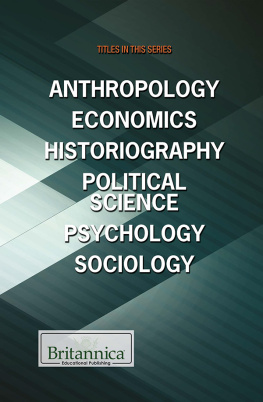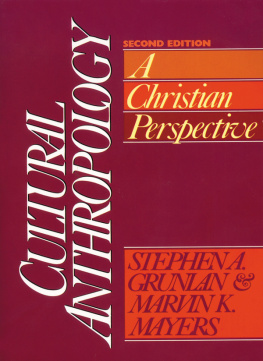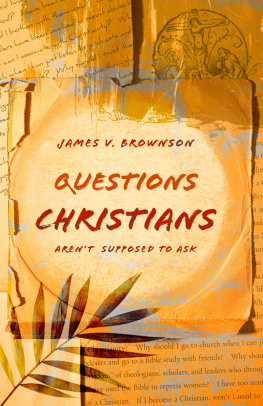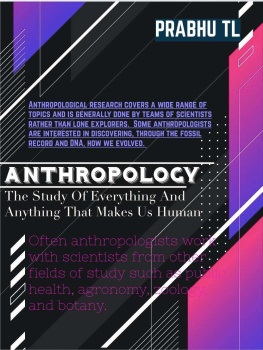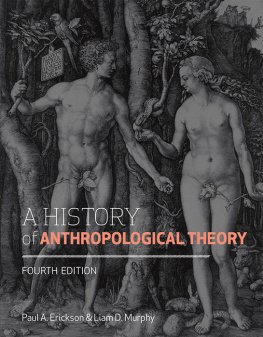Studying the Image
Critical Issues in Anthropology for Christians
by Eloise Meneses
Foreword by Serah Shani
Studying the Image
Critical Issues in Anthropology for Christians
Copyright 2019 Eloise Meneses. All rights reserved. Except for brief quotations in critical publications or reviews, no part of this book may be reproduced in any manner without prior written permission from the publisher. Write: Permissions, Wipf and Stock Publishers, W. th Ave., Suite , Eugene, OR 97401 .
Cascade Books
An Imprint of Wipf and Stock Publishers
W. th Ave., Suite
Eugene, OR 97401
www.wipfandstock.com
paperback isbn: 978-1-5326-3667-7
hardcover isbn: 978-1-5326-3669-1
ebook isbn: 978-1-5326-3668-4
Cataloguing-in-Publication data:
Meneses, Eloise
Title: Studying the image : Critical issues in anthropology for Christians / Eloise Meneses.
Description: Eugene, OR: Cascade Books, 2019 | Includes bibliographical references and index.
Identifiers: isbn 978-1-5326-3667-7 ( paperback ) | isbn 978-1-5326-3669-1 ( hardcover ) | isbn 978-1-5326-3668-4 ( ebook )
Subjects: LCSH: Anthropologysocial and cultural. | Theological anthropology Christianity. | Christianity and Science.
Classification: BT701 .2 M43 2019 ( paperback ) | BT701 .2 ( ebook )
Manufactured in the U.S.A. 02/11/19
Table of Contents
To Rev. Dr. Lesslie Newbigin
Well done, thou good and faithful servant.
and
To my students,
who have made my work rewarding.
Foreword
By Serah Shani
E loise Meneses is a seasoned cultural anthropologist with extensive knowledge of cultures around the world. Her research interests span diverse areas in anthropology that include faith and science, global economic systems, India, womens experience, race and ethnicity, comparative religions, international development, and Christian missions. In addition to her fieldwork in India, she is conversant with the experiences of other people and cultures. Reading this book exposes one to these cultures as she comparatively discusses them to present key ideas. This knowledge provides a wide and holistic view and will appeal to a variety of readers. Readers will make connections, comparisons, and sometimes identify with various aspects of the book as real-life cultural situations are used. Meneses is currently a professor of anthropology at Eastern University in the Department of Global Studies and Service where she has worked for more than twenty-five years as a professor and scholar. She is also a Christian anthropologist, and a second-generation anthropologist in her family. Meneses is devoted to blending theological and scientific anthropologies to form a holistic entity. Funded by the John Templeton Foundation, she founded and became director of the Master of Arts in Theological and Cultural Anthropology at Eastern University. She embraces the significance of engaging theological understandings with anthropological knowledge in order to holistically address multiple aspects of the human condition.
This book, Studying the Image: Critical Issues in Anthropology for Christians, is an illustration of how theological and anthropological perspectives can be engaged to illuminate and further deepen understandings of cultures. It is about engaging the missing links between the two perspectives, and in the process repairing misconceptions caused by overreliance on naturalistic explanations and the neglect of theological insights. Since the period of the Enlightenment, scientific explanations based on empirical findings have taken a front seat, while theological explanations that sometimes did not have, or were perceived not to have, tangible and evidential proofs were relegated to secondary and even marginalized peripheral positions. Yet, religious belief systems continue to shape peoples worldviews and greatly influence their behaviors. In addition, these behaviors can have consequences that are either beneficial or detrimental to humanity. While not dismissive of science, but delving into Christianity, Meneses takes a proactive approach to make sense of the scientific explanations of cultural customs and habits, and to understand them through a Christian biblical and theological lens.
The book attracts a broad audience in its content and readability. It is written in a style that is easy for readers to understand. Also, the content is applicable to many kinds of readers as it addresses topics that are relevant to everyones social realities; topics like art and religion are subjects that exist in all cultures around the world. Covering ten topics, the book can be used together with any introduction to anthropology course book, allowing space for further investigation into these topics than a textbook is able to provide.
I have used the book Studying the Image as a supplemental text in all of my introduction to anthropology classes for over four years. Approximately or more of my students have read this book. My students, in both schools at which I have taught, Eastern University and Westmont College, have described how the book has helped them learn, understand, and appreciate anthropology from a Christian perspective. This has made it easier for me to integrate faith in the classroom, a crucial requirement in most Christian colleges and universities. I find that my students understand and use this book as a resource especially when discussing the connections between my teaching and contemporary and global Christian processes. I think most anthropology, mission studies, international development, and cross-cultural communication classes could benefit from this book. I have received positive comments regarding the books usefulness in explaining, critically analyzing, comparing, and drawing conclusions on critical issues in anthropology for Christians.
Christian liberal arts colleges are faith-centered institutions. The coursework is expected to enable students to integrate learning with faith in most studies and to understand learning from a Christian perspective. Learning involves integrating secular scientific disciplines with Christian intellectual thought. It involves integrating biblical principles into the teaching such that students become well rounded, addressing every aspect of our lives as human beings so as to live a more productive life with ourselves and others, to be effective and informed members of society, and to be ready to meet Christ. While all liberal arts colleges aim to impart a broad general knowledge and to develop general intellectual capacities, Christian liberal arts colleges make knowledge more impactful by working for Gods kingdom and a heavenly future, without compromising quality and rigor, and by providing space for students to excel both as learners and as Christians. Studying the Image provides such space in the teaching of various topics in anthropology that are important to Christians.
Eloise Meneses addresses some of the most difficult questions Christian anthropologists encounter in trying to make sense of pertinent issues in the understanding of humanity. Throughout the book, she tackles challenging topics. As an example, in a scientifically charged world where a high value on empirical evidence coupled with plural truths is prevalent, how do we know what is true? And how can we engage biblical knowing in a world where religious beliefs are questioned and at the same time respect those with different opinions? In a high-tech and highly globalized world, most people are likely to meet and interact with people from other cultures through travel and virtual interactions. In addition, with the increased levels of migration and transnationalism, these cultures can now be found in our own backyards. Sometimes these cross-cultural interactions will give us good experiences, but sometimes there will be experiences that are disturbing, and even outright unpleasant. In this book, Meneses challenges readers to explore answers to the following questions: How should Christians respond to beliefs and practices from other cultures which they find disturbing or repulsive? How do we distinguish ethnocentrism from legitimate commitment to beliefs and practices? How does the Christian theological conception of the cultural mandate differ from the Western secular conception of the theory of progress? How can we as Christians best give service to our cultures as part of our membership in the kingdom of God? The book is very engaging as she explores controversial topics like evolutionary theory, deconstructing race and ethnicity, social order and social change, politics and the kingdom of God, the role and purpose of aesthetics in culture, Christianity and the other religions, and finally studying and living the image. By reading this book, you can allow the author to take you into cultural spaces where she discusses, questions, elaborates, and answers questions both from scientific and from theological perspectives.


